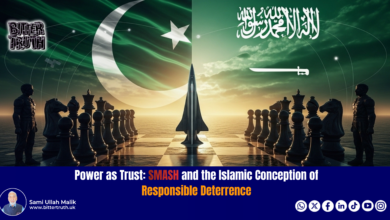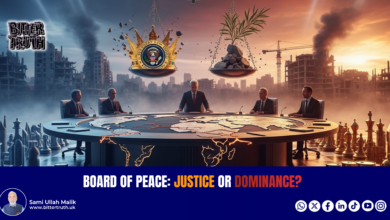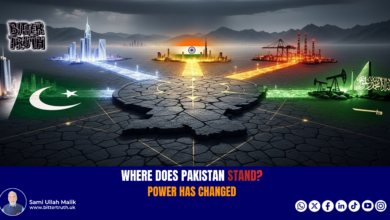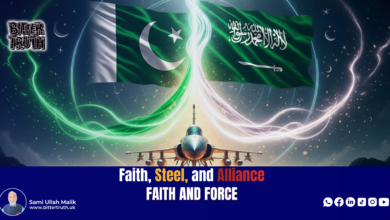Changing Social Mentality: A Challenge
The Impact of Tyranny and the Responsibility of the Pakistani Nation
Typically, translating the word “human” as “Insaan” (person) in Urdu leads to the assumption that a human is simply a human, whether from the East or the West. However, this matter is not as straightforward as it seems—it is, in fact, more complex. Every civilization, or system of life, has its own distinct concept of individuality. The foundation for determining this concept lies in answering the question, “Who am I?” (Answers to questions like the purpose of life, what is good, what is evil, etc., are also derived from answering this fundamental question). Historically, the most commonly accepted and valid answer to this question has been, “I am a servant (Muslim),” and for a long time, this concept of individuality was considered the legitimate expression of humanity. While there have always been societies and individuals who gave contrasting answers to this question, the majority of societies (especially religious ones) were based on this religious concept of individuality.
In European societies of the 17th and 18th centuries, under the influence of the Enlightenment, a new answer to this question began to emerge (and is now deeply ingrained in those societies): “I am not a servant, but rather free and self-sufficient.” (The origin of this notion of selfhood can be traced back to Descartes’ famous statement, “I think, therefore I am.” According to this idea, the only being in the universe that justifies its own existence and is beyond doubt as the source of knowledge is the “I,” meaning “I exist.”) In Enlightenment thought, this free and self-sufficient concept of self is referred to as “human.” The human denies its servitude and claims self-sufficiency—in other words, the “human” is a concept of self or person that rebels against Allah.
The famous Western philosopher Michel Foucault states that the “human” was born for the first time in human history in the 17th century—not in the sense that humans did not exist before, nor in the sense that this was a more intelligent form of human while earlier humans were ignorant. Rather, it means that before this time, no human civilization or system of thought considered freedom to be the legitimate expression of individuality. (In a way, this was a new form of disbelief or atheism.) Prior to this, the term “mankind” (God’s subjects and creatures) was used for humanity, while the concept of “humanity” was developed in the 17th century. The discourse of humanism actually stems from this concept of the “human,” in which the fundamental trait of humanity is to be free and self-sufficient, and reason is understood as the acceptance of increasing human freedom (i.e., making humans practically self-sufficient) as the purpose of life. Humanity is a crucial concept in modern Western atheism, and the various schools of thought that emerged from Enlightenment thinking (such as liberalism, socialism, nationalism, etc.) are different interpretations and justifications of this concept of humanity.
Those who, out of ignorance of the fundamental role of faith in determining individuality, say that “a human is simply a human,” are making an overly simplistic claim. (Concepts such as the purpose of life, good and evil, knowledge, truth, justice, the formation of social and political order, etc., all change dramatically based on how this question is answered.) To use an easy analogy, consider that the figure of Jesus (Isa) is a common figure shared between Muslims and Christians (both historically recognize the same person as Jesus), but the reason for disagreement over the past 1,400 years has been the “concept of Jesus,” not the “person of Jesus.” (For one, Jesus is the son of God, while for the other, he is a messenger of God.) If someone were to say, “Jesus is just Jesus, and Muslims and Christians are fighting over nothing,” they would certainly be making an uneducated statement. Similarly, to refer to a “human” as just a person, and to also refer to a Muslim as a person, creates the same kind of confusion. Clearly, a person who considers themselves a servant of God and one who sees themselves as God cannot possibly build the same kind of life (society or state).
They will tell you, “First, become a human, then a Muslim.” (This is a long-standing and attractive argument used by secularists to lure the masses.) You should ask them, “Alright, tell me, what does it mean to be a human before being a Muslim?” You see, being a Muslim means that “I am fundamentally and truly a servant of God.” Is there some reality outside of or prior to this truth that you want me to affirm?
إِنَّاخَلَقْنَا الْإِنسَانَ مِن نُّطْفَةٍ أَمْشَاجٍ نَّبْتَلِيهِ فَجَعَلْنَاهُ سَمِيعًابَصِيرًا۔إِنَّاهَدَيْنَاهُ السَّبِيلَ إِمَّاشَاكِرًاوَإِمَّاكَفُورًا(انسان:2-3)
Indeed, We created man from a sperm-drop mixture that We may try him; and We made him hearing and seeing. Indeed, We guided him to the way, be he grateful or be he ungrateful.
In reality, the majority of people who make this claim do not even understand its true meaning. The question “Who am I?” has two dominant answers in the modern era. One is that “I am a servant of Allah (Muslim),” and the other is that “I am free and self-sufficient.” The invitation to be “human” before being Muslim essentially seeks to make one admit, “I am inherently free.” The idea is that identifying oneself as a Muslim or anything else is merely a set of beliefs adopted by this free being through its own will, but they are not the ultimate reality. The true reality, according to this view, is my will, which creates reality itself.
وَاللَّهُ أَخْرَجَكُم مِّن بُطُونِ أُمَّهَاتِكُمْ لَاتَعْلَمُونَ شَيْئًا وَجَعَلَ لَكُمُ السَّمْعَ وَالْأَبْصَارَوَالْأَفْئِدَةَ،لَعَلَّكُمْ تَشْكُرُونَ(النحل:78)
And Allah has extracted you from the wombs of your mothers not knowing a thing, and He made for you hearing and vision and intellect that perhaps you would be grateful.
It must be thoroughly understood, absolutely and completely, that being human is not my true essence; rather, it is just one of the possible forms of “being a servant of Allah.” The potential forms of my existence could have been that I might have been a tree, an animal, a mountain, a stone, or even an angel or a jinn. However, in every possible form of my existence, I would have still been a servant (creation) of Allah. In this universe, there is no possibility of my existence where I am anything other than fundamentally a servant of Allah. Being human is not my true essence; rather, it is an accidental aspect of my existence, in the sense that Allah created me in whatever state He willed. He was not compelled to make me human—this is purely His grace. Therefore, the question, “Am I fundamentally Muslim or human?” has a very clear answer: fundamentally and in essence, I am a servant of Allah (Muslim), and I am human incidentally. My essential state is to be “with Allah,” not an independent existence beyond Him. There is no other reference point for defining my humanity except to claim autonomy.
The moment I attempt to answer the question “Who am I?” without reference to Allah, I inevitably assume myself as existing independently of and before Allah, and this is the root of atheism. The existence of Allah precedes my human consciousness, and the declaration “La ilaha illallah” (There is no god but Allah) affirms this reality. The statement “Become human before becoming Muslim” is a denial of this very declaration (as if saying “There is no god but the human”).
Now that it has been made clear that my true essence is not being human but being a servant of Allah (Muslim), it is appropriate to also clarify the true meaning of faith and disbelief, and why being a servant of Allah is synonymous with being Muslim.
وَنَفْسٍ وَمَا سَوَّاهَا۔فَأَلْهَمَهَا فُجُورَهَا وَتَقْوَاهَا۔قَدْ أَفْلَحَ مَن زَكَّاهَا۔وَقَدْ خَابَ مَن دَسَّاهَا(الشمس:7-10)
And [by] the soul and He who proportioned it. And inspired it [with discernment of] its
wickedness and its righteousness, He has succeeded who purifies it, And he has failed who instills it [with corruption].
Understand that fundamentally and truly, every human being is a servant of Allah, whether they acknowledge it or deny it. No human’s denial of this truth can alter their real status in the universe. If one admits this truth with both tongue and heart, they are called a believer and a Muslim; if they deny it, they are called a disbeliever (kafir). It is important to know that a disbeliever does not discover a new reality through their disbelief; rather, they are denying their own reality, which is why they are called “kafir” (one who conceals and denies the truth).
Once it is clear that I am fundamentally a servant, the next question arises: how can I, as a human, become a servant? The answer to this is:
إِنَّ الدِّينَ عِندَ اللَّهِ الْإِسْلَامُ وَمَا اخْتَلَفَ الَّذِينَ أُوتُوا الْكِتَابَ إِلَّا مِن بَعْدِ مَا جَاءَهُمُ الْعِلْمُ بَغْيًا بَيْنَهُمْ وَمَن يَكْفُرْ بِآيَاتِ اللَّهِ فَإِنَّ اللَّهَ سَرِيعُ الْحِسَابِ(العمران:19)
Indeed, the religion in the sight of Allah is Islam. And those who were given the Scripture did not differ except after knowledge had come to them – out of jealous animosity between themselves. And whoever disbelieves in the verses of Allah, then indeed, Allah is swift in [taking] account…..And also this …..
وَمَن يَبْتَغِ غَيْرَ الْإِسْلَامِ دِينًافَلَن يُقْبَلَ مِنْهُ وَهُوَفِي الْآخِرَةِ مِنَ الْخَاسِرِين (العمران:85)
And whoever desires other than Islam as religion – never will it be accepted from him, and he, in the Hereafter, will be among the losers.
It should be understood that anyone who adopts a method other than Islam to express their humanity will find that such expressions of humanity will not be accepted by God. Therefore, my humanity will only be valid when I use it as a means to express servitude, and the only credible way to learn how to express servitude is through the message that Allah revealed to His last Messenger (peace be upon him). Apart from this single method, all other ways of expressing servitude are rejected.
Once it is clear that I am a servant of Allah, I remain His servant in both solitude (private life) and in my relationships with others (public life). It is logically untenable to suggest that in solitude, as a human, my wife and I are servants of Allah, but as soon as we establish relationships, we are no longer bound to obey His commands. Such a notion can only be accepted by someone who has lost their rationality. If I truly am a servant of Allah, then I am that in every aspect of my life. I have no basis or reference to address anyone outside of myself, nor do I have any sphere outside of the message revealed by Allah in which I can engage in dialogue with others. Whenever I address someone, I do so based on what Allah’s command requires of me. When I speak to a non-Muslim, I invite them to this right, rather than engaging in a dialogue within a framework of rights that is beyond that. Therefore, I do not acknowledge the right to life of a non-Muslim simply because “every human being, as a mere human, possesses certain natural rights that I must respect.” Rather, I acknowledge it because it is Allah’s command, which I am obliged to uphold. I hold no right to determine what is right or wrong in my personal life or in the collective; this is the meaning of acknowledging “Muhammad is the Messenger of Allah.”
Now, when they refer to “humanity” instead of “Islam,” it seems appropriate to present the fundamental issue they are often unaware of. I can hold various fundamental references regarding my humanity, for instance, I might say that I am fundamentally a Rajput, or that I am fundamentally Punjabi, or that I am fundamentally Pakistani, or that I represent the labour or capitalist class, or that I am fundamentally a Muslim, Hindu, or Christian. Whatever reference I choose for my identity, I hold a moral justification to strive for its survival and dominance.
They might tell you that you are not fundamentally any of these, but that these are merely expressions of your identity. You can then ask them, “What, then, am I fundamentally?” They would reply that fundamentally, you are a free and autonomous (self-sufficient) being who has the right to define good according to their own will. Hence, being a Muslim is not the essence; it is merely a way of defining a good under one’s own will. This is not the only good, but just one of the countless concepts of good. In other words, abandon the reference to Allah and adopt the references to good that you create on earth, and strive for that. This, in their view, is the true meaning of being human, which they consciously or unconsciously want you to acknowledge.
“Human rights” are the rights of “humans.” The belief of humans is that a human is a self-sufficient and autonomous existence. Someone who holds such a belief about humanity is referred to as an atheist. This atheist’s premise is that in order to understand the principles of justice, every person must first deny their religion and assume themselves to be a self-sufficient existence. That is, to find the answer to “What is justice?” it is essential for everyone to become an atheist (from Locke to Rawls, all humans believe this). Clearly, the principles of justice and the details of rights established in this atheistic context will also be atheistic. This atheist (human) insists that justice and fairness are the names of the very rights that we atheists have established, and that every religion and tradition in the world is as valid as it confirms these principles. Therefore, it is necessary for all humans who hold the various religions and traditions to make decisions in accordance with these principles. If any religion or ideology suggests suspending the rights determined by these atheistic principles, it is deemed coercive and oppressive. Yet, these atheists themselves attempt to impose their principles on all religions and traditions by force, as human rights are principles established within an atheistic framework. Thus, the promotion of human rights leads to the dominance of atheism.
Final Remarks on Some Lessons of Faith
It is essential to thoroughly understand the few lessons of belief mentioned here, as modern atheism has caused devastation in beliefs due to such attractive claims and terminologies that mislead people themselves and cause them to mislead others as well. The details presented above are aimed at refuting and clarifying the errors in the argument put forth by secularists that society and the state should be based on something that is common among all humans. Since we are fundamentally human, not Muslims, Hindus, etc., it follows that religion is not a fundamental trait or common value of humanity.
Based on this key argument (whether one is first and foremost a human or a Muslim/Hindu), these individuals raise the case for expelling religion from social life. If one understands what has been stated, the fundamental error of the secular discourse will become clear.
مِنْ أَيِّ شَيْءٍ خَلَقَهُ۔مِن نُّطْفَةٍ خَلَقَهُ فَقَدَّرَهُ۔ثُمَّ السَّبِيلَ يَسَّرَهُ۔ثُمَّ أَمَاتَهُ فَأَقْبَرَهُ۔ثُمَّ إِذَا شَاءَ أَنشَرَهُ(عبس:18-22)
From what substance did He create him? From a sperm-drop He created him and destined for him; Then He eased the way for him; Then He causes his death and provides a grave for him. Then when He wills, He will resurrect him.
Now, let us take a look at the situation in our homeland after all these arguments.
The question is, how can we change the current mindset of society? In Pakistan, the civil service is a legacy of the British era. It was established by the British to implement their rule, which considered itself superior to the public in all circumstances. However, we have neither been able to reform this system nor has there been any commendable role played by politicians. Present-day Pakistan is not in a position to compete economically on a global scale, nor can it compete with other countries in the region based on various social indicators. The terms used by the elite towards citizens are derogatory. There is a pressing need for a well-defined social contract between the state and its citizens that applies equally to rulers, owners, and the general populace.
In Pakistan, it is often lamented that the country has been under military rule for a long time, but it is also a fact that the most prosperous periods of the country are often attributed to those military rulers. One factor behind China’s success is that most individuals in governance are experts in their fields. For instance, the current President of China is a chemical engineer. During the British Raj, merit was strictly observed. Now, however, we face political appointments and pressures for all government employees. Most of us follow the notion that the standard of respect in society is linked to acquiring dollars, and in this desire, no distinction is made between what is lawful and unlawful. In the pursuit of dollars, even government employees are not exempt. After the “pursuit of dollars,” how can we expect decisions based on competence, integrity, justice, and merit? Therefore, we need to change the mindset of society.
Let’s try to understand the ground realities. Divine assistance did not come during the time of Spain, nor did it arrive to save the Ottoman Caliphate, nor to stop the establishment of Israel, nor during the Babri Masjid incident, nor during the situations in Iraq and Syria, nor in Myanmar, nor during the Gujarat riots, nor for Kashmir. Yet, voices are raised in homes and mosques for divine assistance? Divine help came in the Battle of Badr when 313 faced 1,000 in the battlefield. It came in the Battle of the Trench when the Prophet ﷺ tied two stones around his belly and himself dug the trench before entering the battlefield. Divine assistance came in Afghanistan when hungry, thirsty Muslims entered the battlefield in a state of utter helplessness.
Dressed in the world’s finest attire, hoarding wealth, sitting in luxury air-conditioned vehicles (utilizing products made by those disbelievers), bowing and kissing the hands of people, seeking their admiration, and sitting on the pulpits of mosques, they await divine help? Satisfied with the systems of tyranny and then expecting divine assistance??? Instead of striving for the implementation of Allah’s and His Prophet ﷺ’s system on Allah’s earth, they are merely awaiting divine help while engaging in poetry recitals, gatherings of celebration, or spinning prayer beads in vain?
Rather than making themselves and other Muslims strive for Jihad, they choose to be mere bystanders, full of their bellies and awaiting divine help? Observing the oppression and hardships faced by Muslims, they merely pray, “O Allah, drown the enemy, or O Allah, destroy the enemy… or O Allah, help the oppressed, or grant guidance to the enemies, and if guidance is not in their fate, drown them.” They are satisfied with such desperate prayers and continue to enjoy their meals before returning to a deep sleep, all while expecting divine assistance? Are they placing everything in Allah’s hands while retreating from action and merely waiting for divine help?
They fear stepping into the battlefield while waiting for angels to descend from the heavens to assist Muslims? In such a situation, there will be no divine help, only punishment, which we are experiencing in the form of our short-sighted rulers, corrupt officials, hoarding, unjust profiteering, lying, cheating, malpractices, selfishness, and other economic and social evils! It is time to awaken from the slumber of ignorance, seek knowledge, embody good character, and strive continuously towards our merciful Lord for help. Only then will you understand the meaning of being “the best of creation” and know “who you are.”






